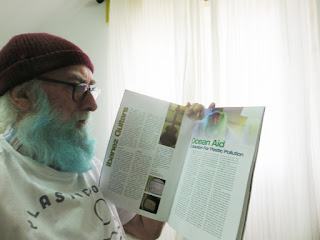We've got to save the birds, we've got to save the bees, We've got to save the forests, we've got to save the seas. When I look at all the mess we've made, I think it's time for ocean aid. Micro-plastic pollution, it's bound to make you think, it is even in the air and the water that we drink. The Amazon has burned so much, Australia's been burning too, Wildfires are the new normal, so what are we gonna do?
We've got to save the birds, we've got to save the bees, We've got to save the forests, we've got to save the seas. When I look at all the mess we've made, I think it's time for ocean aid.
There's an insect Armageddon, a sixth great extinction underway, But keep the economy growing, There's more jobs I hear them say.
We've got to save the birds, we've got to save the bees, We've got to save the forests, we've got to save the seas. When I look at all the mess we've made, I think it's time for ocean aid.
Where are the real world leaders? Please tell me where they are. The ones in the media are just talking more blah-blah.
We've got to save the birds, we've got to save the bees, We've got to save the forests, we've got to save the seas. When I look at all the mess we've made, I think it's time for ocean aid.
“Time For Ocean Aid” is part of my much bigger, in fact mind-bogglingly massive, “Ocean Aid” project. You see, I am hoping that one day there will be a stadium-sized “Ocean Aid” concert, or concerts, with many internationally famous rock and pop acts taking part. It is an international campaign too because the oceans are under threat worldwide. Plastic pollution, overfishing, seabed mining, oil spills, nuclear waste, “dead zones,” coral bleaching, military testing and sonar, as well as, last but certainly not least, climate change, are all taking a heavy toll on marine life and the health of the oceans. I want to raise funds for Sea Shepherd and was honoured by having Captain Paul Watson, who founded Sea Shepherd, endorsing my book Saving Mother Ocean. My message is finding media coverage around the world but I need it to keep on doing so. So far I have been in Filippo Solibello’s book SPAM Stop Plastic A Mare, published in Italy, I’ve been featured twice in The Portugal News, been on the radio in Spain, Ireland and the US, been featured in the GONZO Weekly in England, given coverage in The Wave magazine of the Rotary Club of Wyndham Harbour in Australia. In Wales, the country I was born in, I am delighted to have the full support of Mike Kennedy, who runs SWND Magazine and the SWND Records label. “Ocean Aid” has been featured in a 2-page article in the SWND Magazine.





























